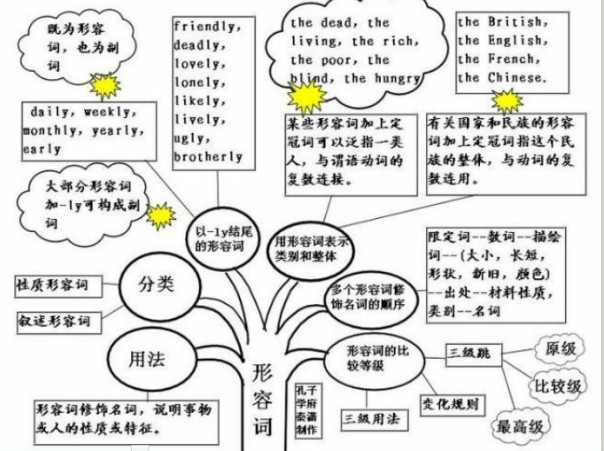本试题 “The __________ girl sat in the corner, __________.[ ]A. frightening; cryingB. frightening; criedC. frightened; cryingD. frightened; to cry” 主要考查您对形容词
现在分词
等考点的理解。关于这些考点您可以点击下面的选项卡查看详细档案。
- 形容词
- 现在分词
形容词的概念:
形容词(adjective),简称adj.或a,形容词用来修饰名词或代词,表示人或事物的性质、状态,和特征的程度好坏与否,形容词在句中作定语、表语、宾语补足语。通常,可将形容词分成性质形容词和叙述形容词两类,其位置不一定都放在名词前面。
形容词的作用与位置:
形容词是用来修饰名词的,常被放在名词前作定语,或放在系动词后面作表语。以下属几种特殊情况,须牢记;
(1)形容词短语作定语,定语后置。
如:a language difficult to master,
a leaning tower about 180 feet high
(2)表语形容词(afraid、alike、alone、asleep、awake、alive等)作定语,定语后置。如a man alive。有些表身体健康状况的形容词如well、faint、ill只作表语。sick既可作表语又可作定语,ill如作定语意为“bad”。
(3)用作定语,修饰由不定代词one、no、any、some和every构成的复合词如anything、something等时,通常后置。
如:I have something important to tell you.
(4)else常用作疑问代词和不定代词的后置定语。
(5)enough、nearby修饰名词前置或后置,程度副词一般位于形容词、副词前面,enough修饰形容词、副词时,必须后置。
(6)几个并列的形容词作定语,其语序通常为:限定语(The、A)+描绘性形容词+size(大小)+shape(形状)+age(年龄、时间)+color(颜色)+origin(国籍、来源)+material(材料)+purpose(目的)+名词。
口诀:
限定描绘大长高,形状年龄和新老;颜色国籍跟材料,作用类别往后靠。
如:a heavy black Chinese steel umbrella,
the man's first tow interesting little red French oil paintings
形容词的用法:
1、形容词修饰名词,说明事物或人的性质或特征。通常,可将形容词分成性质形容词和叙述形容词两类,其位置不一定都放在名词前面:
1)直接说明事物的性质或特征的形容词是性质形容词,它有级的变化,可以用程度副词修饰,在句中可作定语、表语和补语。例如:hot热的。
2)叙述形容词只能作表语,所以又称为表语形容词。这类形容词没有级的变化,也不可用程度副词修饰。
大多数以a开头的形容词都属于这一类。例如:
afraid害怕的。(错)Heisanillman. (对)Themanisill. (错)Sheisanafraidgirl. (对)Thegirlisafraid.
这类词还有:well,unwell,ill,faint,afraid,alike,alive,alone,asleep,awake等。
3)形容词作定语修饰名词时,要放在名词的前边。但是如果形容词修饰以-thing为字尾的词语时,要放在这些词之后。例如:somethingnice
2、用形容词表示类别和整体:
1)某些形容词加上定冠词可以泛指一类人,与谓语动词的复数连接。如:the dead,the living,the rich,the poor,the blind,the hungry The poorarelosinghope.穷人失去了希望。
2)有关国家和民族的形容词加上定冠词指这个民族的整体,与动词的复数连用。如:the British,the English,the French,the Chinese. The English have wonderful senseofhumor.
以-ly结尾的形容词:
1)大部分形容词加-ly可构成副词。但friendly,deadly,lovely,lonely,likely,lively,ugly,brotherly,仍为形容词。改错:
如:(错)She sang lovely.
(错)He spoke to me very friendly.
(对)Her singing was lovely.
(对)He spoke to me in a very friendly way.
2)有些以-ly结尾既为形容词,也为副词。 daily,weekly,monthly,yearly,early .
如:The Times is a daily paper.
The Times is published daily.
形容词知识体系:

复合形容词的构成:
(1)形容词+名词+ed:
如:kind-hearted 好心的,white-haired 白发的
(2)形容词+形容词:
如:red-hot 炽热的,dark-blue 深蓝的
(3)形容词+现在分词:
如:good-looking 好看的,easy-going 随和的
(4)副词+现在分词:
如:hard-working 勤劳的,fast-moving 快速转动的
(5)副词+过去分词:
如:hard-won 得来不易的,newly-made 新建的
(6)名词+形容词:
如:life-long 终生的,world-famous 世界闻名的
(7)名词+现在分词:
如:peace-loving 爱好和平的,fun-loving 爱开玩笑的
(8)名词+过去分词:
如:snow-covered 白雪覆盖的,hand-made 手工的
(9)数词+名词+ed:
如:four-storeyed 4层楼的,three-legged 3条腿的
(10)数词+名词(名词用单数):
如:ten-year 10年的, two-man 两人的
现在分词的概念:
现在分词(PresentParticiple)(又称-ing形式),是分词的一种,是非限定动词,即在句子里面不能单独充当谓语,但能充当其它的一些成分(定语,表语,补语和状语)。一般式:doing;一般被动式:being done;完成式:having done;完成被动式:having been done。所有否定式都是在-ing前面加not。
现在分词的用法:
1)做表语:
如:He was very amusing.
That book was rather boring.
很多动词的现在分词都可以作表语:exciting, interesting, encouraging, disappointing, confusing, touching, puzzling.
2)作定语:
上面所出现的现在分词都可以用作定语,修饰一个名词:
如:That must have been a terrifying experience.
I found him a charming person.
现在分词短语还可以放在名词的后面修饰名词,相当于一个定语从句:
如:There are a few boys swimming in the river.
There is a car waiting outside.
3)作状语:
现在分词短语可以表示一个同时发生的次要的或伴随的动作:
如:Following Tom, we started to climb the mountain.
Opening the drawer, he took out a box.
Taking a key out of his pocket, he opened the door.
现在分词短语还可以表示原因,相当于一个原因状语从句:
如:Not knowing her address, we couldn't get in touch with her.
Being unemployed, he hasn't got much money.
现在分词短语还可以表示时间,相当于一个时间状语从句:
如:Hearing the news, they all jumped with joy.
Returning home, he began to do his homework.
Jim hurt his arm while playing tennis.
Be careful when crossing the road.
Having found a hotel, we looked for some where to have dinner.
Having finished her work, she went home.
4)作宾补:
现在分词在一些动词之后可以做宾语的补语:
例如:see, hear, catch, find, keep, have等。
如:I see him passing my house every day.
I caught him stealing things in that shop.
I smelt something burning.
She kept him working all day.
现在分词其他用法解析:
1、现在分词一般式的用法:
现在分词的一般式所表示的动作与主语动作同时发生:
如:When we arrived, we found him sleeping. 我们到达时发现他在睡觉。
Living in the 示的动作也可略早于或迟于谓语动作,但两者之间没有时间间隔:
如:Seeing nobody at home, he decided to leave a note. 发现没有在家,他决定留个字条。
He went home, finding the door locked. 他回到家,发现门是锁着的。当现在分词所表示的动作略迟于谓语动作时,现在分词通常位于句末。
2、现在分词完成式的用法:
现在分词的完成式主要表示发生在谓语动作之前的动作:
如:Having been there once, she knew the place quite well. 由于去过那儿一次,她对那地方很熟悉。
Having failed twice, he didn't want to try again. 他已经失败了两次,不想再试了。
注:(1)现在分词的一般式和完成式均可表示已完成或先于谓语的动作,但有区别:现在分词所表示的动作虽然可以先于谓语动作,但两者之间没有时间间隔,而现在分词的完成式所表示先于谓语的动作则与谓语动作有一定的时间间隔:
如:Locking the door, he went out. 锁好门之后,他就出去了。
Having invited him here to speak, we'd better go to his lecture. 既然我们请了他来作报告,我们最好去听一下。
有时即使是分词动作与谓语动作几乎同时发生,但如果要强调分词动作的完成性,也应用现在分词的完成式:
如:Having bought our tickets, we went into the theatre. 我们买好票后就走进剧场。
(2)现在分词的完成式一般不用作定语:
误:Do you know anyone having lost a cat? 你知道有谁丢了一只猫吗?
误:I want to talk to the person having broken the window. 我想同打破窗户的人谈谈。
若将以上现分词的完成式改为一般式也不可以(因为现在分词作后置定语时通常只表示与谓语动作同时或几乎同时发生的动作,而不能先于谓语动作而发生):
误:I want to talk to the person breaking the window.
3、现在分词被动式的用法:
当要表示一个被动动作时,现在分词就用被动形式。现在分词的一般式和完成式均有被动式形式:
(1)现在分词一般式的被动式:主要表示现在正在进行的动作,也可表示与谓语动作同时发生的动作:
如:Who is the woman being operated on? 正在动手术的女人是谁?
I saw him being taken away by the police. 我看见他被警察带走。
注:有时现在分词一般式的被动式所表示的动作也可发生在谓语动作之前(此时的现在分词通常用于表示原因,且多为状态动词):
如:Not having a car, he finds it difficult to get around. 由于没车,她感到行动很困难。
(2)现在分词完成式的被动式:主要表示发生在谓语动词之前且已经完成的动作。
如:The subject having been opened, he had to go on with it. 话题已经开始了,他不得不谈下去。
Having been written inhaste, the book has many mistakes. 这书因写得仓促,所以错误不少。
比较:Being so ill, she can't go to school. 由于病得那么严重,她不能去上学。
Having been ill for a long time, he needed time to recover. 由于病了很长时间,他需要一段恢复的时间。
与“The __________ girl sat in the corner, __________.[ ]A. f...”考查相似的试题有:
- 短文改错。It was 9∶20 that I got to the English Corner.Some were reading some papers,and some were talking while othe...
- Although it is ________ to watch programs on TV sometimes, I think people shouldn’t spend all the time watching it.A...
- We’re going to visit so many ______ places and do lots of _______ things .A.exciting, astonishingB.excited, astonis...
- 短文改错。This autumn my class went to Dalian to go the camping. We arrived at a sandy beach with a well view of the ...
- The finance minister is not very ____ now since he has raised taxes to such a high level.A.famousB.well-knownC.pop...
- Tom is _____ that I can tell him my secrets and worries.[ ]A. such reliable a friendB. so reliable a friendC. a such ...
- 58. The patient suffering from cancer looked dead but the faint pulse proved that he was still .Alive B. life C. aliv...
- 29. ____ time and labour, you should join hands ____ him in the business.A.To save; withB.Saved; withC.Saving; wit...
- Sally had no pen ____ yesterday morning. A.to writeB.to write withC.writingD.writing with
- An army spokesman stressed that all the soldiers had been ordered _____ clear warning before firing any shots.A.to i...